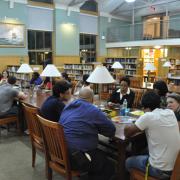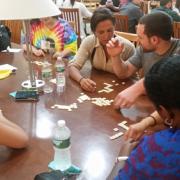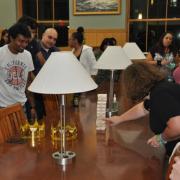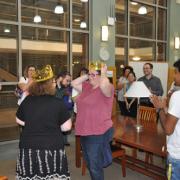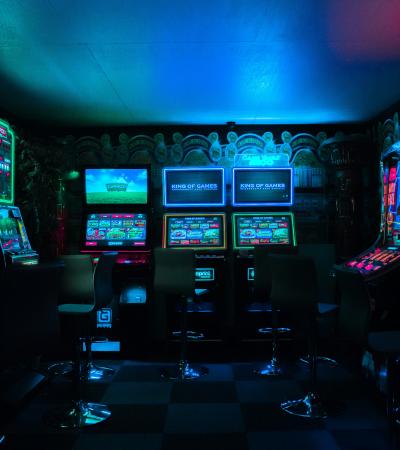Sure, you've played Trivial Pursuit. Maybe you've pulled a Jenga block in your lifetime. Perhaps you think you're a Bananagrams wiz.
That's all out the window in this do-or-die, fast-paced battle where participants sign up in pairs to compete in the ultimate board game showdown. The final team left standing became the reigning champions, crowns and all.
Advanced Planning
Over the years we've acquired a small collection of board games. They're used in programs, live in our teen lounge and get used sporadically. Wanting to create an active rather than passive experience, we decided to host a tournament in which teams of two would have ten minutes to play quick rounds of some of our most beloved games.
In planning for the event, we made sure to select games that had an unbiased winner or point system. Any games that were up to the discretion of another player (like Apples to Apples or Pictionary) were left out.
Marketing
Board Game Battle Royale was part of our Adult Day Camp series, targeting adults in their 20s and 30s. All of our Adult Day Camp events are marketed solely through Meetup, a social site where people can sign up for events hosted by other users in their area.
Budgeting
I spent $15 on plastic bejeweled crowns and another $30 on beer and snacks. All of the board games we already had from past events.
Day-of-event Activity
My colleague, Kim, and I selected Trivial Pursuit, Scattergories, Bananagrams and Taboo for the battle. Jenga was selected for the last two standing teams to compete against each other in the final round.
To help direct the teams, each seat had a Post-It note with an arrow indicating the game a team should play after the first round (think speed dating, except everyone moves). We also had a small cart with salty snacks and a few bottles of beer and seltzer nearby.
For keeping score, we used a giant rolling whiteboard.
Program Execution
We held the event after hours on a Friday night in our research room. Attendees began to trickle in at 6:45 p.m., and we spent the first 10 minutes mingling and snacking. If attendees arrived in pairs, we'd ask their team name and sign them in on our whiteboard. If someone arrived solo, Kim and I made sure to introduce them to the others. We ended-up with a total of 32 participants for the event.
We also tried to play board game matchmaker by signing individuals up with particpants we thought they'd get along with. This is important to do since one of our "final four" attendees admitted to me that he had been worried about attending by himself because he was afraid he wouldn't meet anyone. At the end of the event, he was overjoyed to have not only made it to the Jenga final round but to have done so with his new friend.
At 7:10 p.m. it was time to play. We assigned teams to one of four stations, as evenly as possible. At this point, Kim and I formally welcomed everyone to the event and explained the rules:
- Groups had one minute to understand the rules of the game, whether from attendees explaining or reading the instructions.
- They would then get 10 minutes to play. Some games were high scoring (Scattergories and Taboo), while others were low (Trivial Pursuit and Bananagrams).
- During battle, the pairs should play as a team. Conferring on a trivia question, for example, was encouraged.
- At the end of 10 minutes, a buzzer would sound and teams would move on to the next game station.
Kim and I would then ask the teams how many points they accumulated. We kept a running total on our whiteboard so everyone could see the standings.
During battle, Kim and I floated around to take pictures and answer gaming questions. After the conclusion of four rounds, where each team had the opportunity to play each game, we tallied up the scores. The two highest scoring teams moved on to compete in the most intense battle of Jenga I've ever witnessed. All of the other teams crowded around the table to cheer on their new friends and to witness eventual victory.
As the Jenga blocks finally fell, we had our crowning ceremony. This was the second time we hosted Board Game Battle Royale, so the previous victors crowned the new winners. It is the new winners' duty to protect the crowns and attend our next event, where we will continue passing on the plastic, bejeweled headpiece.
Advice
The long tables in our research room were wide enough for a game to be played, but they could be a little awkward with a group of six to eight people. If your space allows it, I'd go for smaller tables.
We had a few people arrive late. This isn't a big deal. You can play as their teammate (if there's an odd number) and just hop into an active game.
Moving teams to different game stations can be a little tricky. However, it was worth the extra hassle because we wanted attendees to meet and socialize with each other. You could certainly have some groups that are stationary and some moving to different stations, but you'll only have a few teams getting to know one another.
Don't underestimate the first 10 minutes of mingling. As the event organizer, it's your job to help people connect with one another. About half of our attendees came without a partner. Because we've held events for this community in the past, it was fun for me to introduce potential partners (and friends). If you're anticipating a group of individuals you won't know, it might be fun to have some sort of game to match people up with. For instance, you could have a bowl of cards with two pairs of each card. The pressure to find a partner should be on you as the host, rather than your attendees. You want them to be as comfortable as possible.

